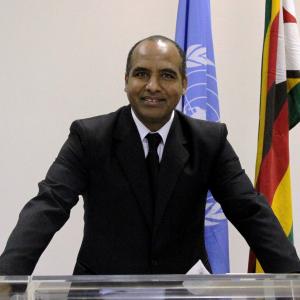3 June 2021, Harare –Today the Ministry of Lands, Agriculture, Fisheries, Water and Rural Resettlement and the United Nations in Zimbabwe jointly launched national and provincial dialogues on food systems.
Launching the national food systems dialogues, Honourable Dr. A J Masuka, Minister of Lands, Agriculture, Fisheries, Water and Rural Resettlement underlined that the UN Food Systems dialogues were adopted to enable systematic and inclusive opportunities for stakeholders to be engaged in food systems.
Noting the Government of Zimbabwe’s focus on transforming production and food systems was in sync with the objectives of the UN Food Systems Summit taking place in New York in September 2021, Dr Masuka said, “The Summit depends on the engagement of citizens all over the world, through a ‘three-stage’ dialogue process.”
The three stage process are: identification of issues affecting food systems and existing national plans for sustainable food systems; identify promising approaches from engagements at sub national level that contribute to the development of national pathways especially in the face of devolution; and national authorities and stakeholder leaders to exchange views about the pathways and commitments of different actors towards sustainable national food systems by 2030.
The launch which brought together over 130 delegates from Government, UN, Civil Society, Private Sector and Communities underlined that sustainable food systems remain critical to the achievement of all the SDGs and are directly related to health and well-being, and environmental sustainability.
Noting that Zimbabwe has joined 116 UN Member States that have committed to convene such dialogues ahead of the global UN Food Systems Summit later in the year, Ms. Maria Ribeiro, UN Resident Coordinator for Zimbabwe said, “the Food Systems Summit is central to the Decade of Action to deliver the Sustainable Development Goals (SDGs) by shaping the future direction and action for food systems.”
The UN Secretary General, in September 2021, will convene a High-Level Food Systems Summit at the General Assembly in New York.
Food systems encompass the entire range of actors and their interlinked value-adding activities involved in the production, aggregation, processing, distribution, consumption and disposal of food products that originate from agriculture, forestry or fisheries, and parts of the broader economic, societal and natural environments in which they are embedded.
The objective of the UN global Food Systems Summit is to come up with solutions to transform food production, consumption, and the ecosystem to “build forward better” from COVID-19 and achieve the 2030 Agenda for Sustainable Development. The Summit aims to deliver the following four outcomes:
- generate significant action and measurable progress towards the 2030 Agenda for Sustainable Development.
- raise awareness and elevate public discussion about how reforming food systems can benefit people and the environment.
- develop principles to guide governments and other stakeholders looking to leverage their food systems to support the SDGs.
- leave a system in place to ensure that the Summit’s outcomes continue to drive new actions and progress.
The national and planned subsequent provincial dialogues, as well as other dialogues that are being organized by Non-Governmental Organizations, including youth groups are expected to deliver perspectives to transform food systems in Zimbabwe.
The United Nations in Zimbabwe in its new five-year UN Sustainable Development Cooperation Framework (2022-2026) in support of national development priorities has adopted environmental protection, climate resilience and natural resource management as one of the four key strategic priority areas.
The UN agencies in Zimbabwe have been supporting national efforts towards reaching the most vulnerable who live in fragile environments across the country and progressively building community resilience and livelihoods.
Following the launch of the national food systems dialogue today, a series of localized dialogues will be convened in all Zimbabwe’s provinces in the coming weeks.
Media Contacts :
Barbra Machekano | Communications Officer | Ministry of Lands, Agriculture, Fisheries, Water and Rural Resettlement | Email: barbsmute@gmail.com | Mobile: +263-773-847213
Kevin Mazorodze| Communications Specialist | Food and Agriculture Organization of the United Nations (FAO) | Email: Kevin.Mazorodze@fao.org | Mobile: +263-718-529889
Sirak Gebrehiwot | Communications Specialist | United Nations Zimbabwe Resident Coordinator’s Office | Email: Sirak.gebrehiwot@one.un.org | Mobile: +263-772-198036


















